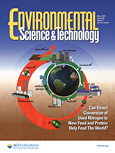Environmental Science & Technology has issued a correction for a March 2015 paper on methane contamination from gas wells after learning that the authors failed to disclose funding from Chesapeake Energy Corp., a major U.S. energy producer.
The paper, “Methane Concentrations in Water Wells Unrelated to Proximity to Existing Oil and Gas Wells in Northeastern Pennsylvania,” came from a group led by Donald Siegel, of Syracuse University. In the correction, Siegel acknowledges having received “funding privately” from Chesapeake for the study, which found:
no statistically significant relationship between dissolved methane concentrations in groundwater from domestic water wells and proximity to pre-existing oil or gas wells. Previous analyses used small sample sets compared to the population of domestic wells available, which may explain the difference in prior findings compared to ours.
The lengthy correction states:
The authors thank the Chesapeake Energy Corporation for access to their baseline groundwater data set for NE Pennsylvania and for providing funding for the authors through their organizations of employment, and privately, in the case of the senior author, to do basic research to explore and evaluate this very large data set. The opinions and conclusions expressed in this paper are strictly those of the authors and do not necessarily reflect those of Chesapeake Energy. We also thank the landowners who allowed their water wells to be sampled.
None of the authors have competing corporate financial interests exceeding guidelines presented by ES&T.
The results of this paper may, however, logically bear on any future work characterizing baseline conditions for dissolved methane. The lead author was funded privately by Chesapeake for this work. The other authors were compensated through their associated employers as part of their regular employment. All authors may continue to consult or work on future basic and applied research on issues related to energy and the topic of this paper. The senior author, for example, is coprinciple investigator on an National Science Foundation funded research project to characterize background methane concentrations in groundwater in western New York, and the results of the work in this paper in ES&T logically may affect how he and colleagues at Syracuse University interpret their much smaller data set obtained in that research.
During the preparation of this specific paper, all authors worked for the organizations whose affiliations are noted in authorship. Bert Smith is a former employee of Chesapeake Energy having worked there from May 2012 to September 2013, and has been employed by Enviro Clean Products and Services from November, 2013 to now. Enviro Clean P&S also does consulting work for Chesapeake. Prior to May, 2013 Mr. Smith worked for Science Applications International Corporation (SAIC), who did consulting work for Chesapeake Energy. Rikka Bothun worked for AECOM during most of the time this paper was under preparation, but left AECOM in December, 2014 and now works for a private consulting company that does not do consulting work for Chesapeake. The CETER Group, Inc. supports a number of different projects in the energy sector, but none directly linked to Marcellus Shale development. AECOM provides architecture and engineering services to government and private industry around the world, including the energy sector.
According to Inside Climate News, the correction was prompted by inquires from the news outlet, which raised questions about the funding from Chesapeake in early April. In addition to failing to disclose payments from Chesapeake to Siegel, the paper also neglected to mention that one of the authors, Bert Smith, had been employed by the energy company for a period of time while the study was being conducted. Smith now works for Chesapeake, ICN has reported.
The original article did note that Chesapeake provided data to the researchers. ICN in April quoted Siegel saying:
“I’ve done work for any number of environmental groups, and I’ve worked for industry” … “I go where the science is. I have no hidden agenda here.” He declined to specify the fee amount he received, other than to say “I didn’t get rich.”
Chesapeake, the nation’s second-largest producer of natural gas, shared its water samples from northeastern Pennsylvania with Siegel about three years ago because he had gained a reputation among oil and gas companies as a fair researcher, he said. “I agreed to work on the project as long as I was unfettered in what I do and say,” Siegel said.
Like Retraction Watch? Consider supporting our growth. You can also follow us on Twitter, like us on Facebook, add us to your RSS reader, and sign up on our homepage for an email every time there’s a new post.

This is not the first time, or the last time for that matter, that a particular industry in a high-visibility, controversial area has turned to a leading scientist to counter conclusions and negative concerns accepted by a majority of scientists and society. Just look up Frederick Seitz. He went to bat for tobacco companies and was a skeptic of ills of tobacco smoking and global warming, for example. He was an anti-communist, a supporter of Vietnam war and nuclear weapons. In their book Merchants of Doubt, science historians Naomi Oreskes and Erik M. Conway state that Seitz “justified his increasing social and intellectual isolation by blaming others”.